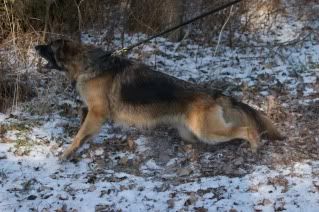 Lack of socialization vs. bad genetics
#190653 - 04/15/2008 10:13 PM Lack of socialization vs. bad genetics
#190653 - 04/15/2008 10:13 PM |
Webboard User

  
Reg: 10-18-2006
Posts: 1849
Loc: St. Louis, MO
 Offline Offline |
|
Hey all. Lately I've been presented with more than my fair share of fearful dogs. Not just dogs with specific fears...I mean dogs that are fearful in general. It's gotten me thinking about the roots of these problems.
These dogs are adolescent or adult dogs (no puppies) that the owners don't have much of a history on before they acquired them. Frequently they're shelter dogs or rescue dogs. Some of them are really responding to socialization and desensitization and leadership exercises while others are progressing much more slowly.
Of course, some of them have owners willing to do more work with their dogs than others, and some owners are just doing too much "poor baby" stuff to really help the dog.
But it has turned my mind to this question: How can you tell if a dog with no known history is fearful because of a lack of socialization/exposure or because of bad genetics?
Obviously, many dogs will have a combination of both...but for argument’s sake, let's consider the extremes:
You're presented with these two very fearful dogs, but you aren't told anything about their histories:
Let's say Dog #1 is a dog with great genetics but is very fearful because it was kept mostly in isolation with the owner for the first year or two of life and rarely left the house.
Let's say Dog #2 is a dog that is very fearful because it was badly bred and has very poor genetics, even though it was still raised in a proper stimulating environment.
Would there be any noticeable ways to tell in beginning which was which in the absence of this information? Is there any way to be reasonably sure that it's a dog's genetics at fault and not isolation/abuse/improper rehab techniques, etc. other than the lack of improvement?
Basically, I've always operated on the premise that, without a history...you start out the same way, regardless of the background. And a well-bred dog will respond to some extent over time once presented with proper socialization, etc., while a dog that is genetically hardwired this way will have less improvement or little to no improvement even over time.
But I realize I'm just guessing here because both situations do take time and there are so many variables that come into play.
I personally had a foster dog that was VERY fearful who I was sure was just genetically fried...and he suprised me in a BIG way. After a couple of years, he is today a still submissive but basically normal, happy, confident dog.
Thoughts?

Carbon |
 Top Top
|
 Re: Lack of socialization vs. bad genetics
[Re: Amber Morgan ]
#190660 - 04/15/2008 10:32 PM Re: Lack of socialization vs. bad genetics
[Re: Amber Morgan ]
#190660 - 04/15/2008 10:32 PM |
Webboard User
  
Reg: 08-16-2007
Posts: 2365
Loc: Toronto, Ontario, Canada
 Offline Offline |
|
i'm interested in this too....luc has a few fear issues, manageable and most vastly improved. but they do exist. i don't think he had proper mental development due to his lack of exposure - i just don't see how it would've been possible - but i am often curious about the role of genes vs. environment w/him. will be interested in peope's comments.
Teagan!
 |
 Top Top
|
 Re: Lack of socialization vs. bad genetics
[Re: Amber Morgan ]
#190661 - 04/15/2008 10:37 PM Re: Lack of socialization vs. bad genetics
[Re: Amber Morgan ]
#190661 - 04/15/2008 10:37 PM |
Webboard User

  
Reg: 03-11-2008
Posts: 703
Loc: VA
 Offline Offline |
|
http://www.leerburg.com/pdf/packstructure.pdf
Read this article. It may answer a lot of your questions. I really like it, and I have directed many people considering rescues to read it.
Fact is, a LOT of rescues are hard-wired to have issues. The same goes for puppy mill puppies. They wind up in shelters many times due to a list of "bad luck". They are bred poorly, the parents may have faulty temperment, therefore the only people who buy them are beginners who don't realize they are being sold a dog with a possible issue. Then, they make honest beginner mistakes and a dog that would really need some help to overcome bred issues ends up being to hard to deal with. The dog is dumped at the animal shelter, picked up by a family wanting a pet, and so on.
When the dog learns that you are trustworthy, they relax knowing you will take care of them. Exposure and socialization does not make a dog calm and trusting. Leadership and training create that. If your dog trusts you to take care of them and that you will protect them, they will step into a boat they are terrified of, cross a river they are fearful of or meet someone they are unsure about - all because you are there to protect them.
Edited by Cameron Feathers (04/15/2008 10:44 PM)
Edit reason: spelling
When a flower doesn't bloom, you fix the environment in which it grows, not the flower. |
 Top Top
|
 Re: Lack of socialization vs. bad genetics
[Re: Cameron Feathers ]
#190662 - 04/15/2008 10:45 PM Re: Lack of socialization vs. bad genetics
[Re: Cameron Feathers ]
#190662 - 04/15/2008 10:45 PM |
Webboard User

  
Reg: 10-18-2006
Posts: 1849
Loc: St. Louis, MO
 Offline Offline |
|
Cameron, thanks, but I think you misunderstood my post. 

Carbon |
 Top Top
|
 Re: Lack of socialization vs. bad genetics
[Re: Cameron Feathers ]
#190664 - 04/15/2008 10:49 PM Re: Lack of socialization vs. bad genetics
[Re: Cameron Feathers ]
#190664 - 04/15/2008 10:49 PM |
Webboard User
  
Reg: 08-16-2007
Posts: 2365
Loc: Toronto, Ontario, Canada
 Offline Offline |
|
i agree leadership makes a huge difference. luc isn't scared of other dogs anymore b/c he knows i will protect him and handle all 'other dogs' situations.
but aren't there - and i haven't had a puppy, so i might be confused - certain periods of mental development where exposure is important? i thought there were 2 fear periods and possibly other sort of mental development periods.
if a dog hasn't been exposed during those periods, could it affect it? i've always wondered if b/c luc was in a shelter for about 3 years from when he was a puppy (and the dogs weren't walked, so again, minimal exposure), if his brain didn't normally develop....he can learn now obviously, and has, but i don't know if he'll ever be a 'normal' dog (and i'm perfectly willing to bet that he may not also come from the world's greatest most stable temperaments). not to take away from the generality of amber's question, just trying to maybe think of ways that it could be more than just genes. sorry if i'm getting off topic!
Teagan!
 |
 Top Top
|
 Re: Lack of socialization vs. bad genetics
[Re: Jennifer Mullen ]
#190665 - 04/15/2008 10:53 PM Re: Lack of socialization vs. bad genetics
[Re: Jennifer Mullen ]
#190665 - 04/15/2008 10:53 PM |
Webboard User
  
Reg: 08-23-2007
Posts: 1196
Loc: Centralia, Missouri
 Offline Offline |
|
I think that generally a genetically fearfull dog will be very slow to respond, if they respond at all.
An underexposed dog with good genetics should come around fairly quickly and be able to deal with basic, low stress problems.
I think that people often want to blame nutty behavior on supposed past abuse rather than admitting that the dog is mentally deficient.
|
 Top Top
|
 Re: Lack of socialization vs. bad genetics
[Re: Amber Morgan ]
#190666 - 04/15/2008 10:57 PM Re: Lack of socialization vs. bad genetics
[Re: Amber Morgan ]
#190666 - 04/15/2008 10:57 PM |
Webboard User
Reg: 09-19-2006
Posts: 37
Loc: Sacramento, CA
 Offline Offline |
|
Basically, I've always operated on the premise that, without a history...you start out the same way, regardless of the background. And a well-bred dog will respond to some extent over time once presented with proper socialization, etc., while a dog that is genetically hardwired this way will have less improvement or little to no improvement even over time.
That is pretty much how fear issues were explained to me. A strong dog can be pulled out of it, while a weaker one will take much more time and positive experiences, if it can be helped at all.
Everyone should try to be as good as their dog thinks they are. |
 Top Top
|
 Re: Lack of socialization vs. bad genetics
[Re: Amber Morgan ]
#190667 - 04/15/2008 11:00 PM Re: Lack of socialization vs. bad genetics
[Re: Amber Morgan ]
#190667 - 04/15/2008 11:00 PM |
Webboard User

  
Reg: 03-11-2008
Posts: 703
Loc: VA
 Offline Offline |
|
I guess what I was meaning to say is that I've always thought it came back to a lack of leadership. That there isn't a problem with the dog because it has weak genes or an abusive past, it's because it had no leadership to trust in. If the dog doesn't have a leader it can trust in, there will be an issue - genetics, socialization aside. I think that genetics can set them back, but that a lack of structure and leadership sets them back more than anything else ever will. If dog #1 had a good leadership and structure, then it shouldn't really be fearful despite the socialization issue. And if dog #2 had owners that understood that it had weak nerves due to genetics, then a lot of time a patience could be spent overcoming this issue and working on building confidence and trust. Either way, if either of these dogs fail it's because they didn't have a good leader not because they have a genetic or socialization issue. Just my opinion on this, I hope I clarified what I meant...
When a flower doesn't bloom, you fix the environment in which it grows, not the flower. |
 Top Top
|
 Re: Lack of socialization vs. bad genetics
[Re: Jennifer Mullen ]
#190669 - 04/15/2008 11:03 PM Re: Lack of socialization vs. bad genetics
[Re: Jennifer Mullen ]
#190669 - 04/15/2008 11:03 PM |
Webboard User

  
Reg: 10-18-2006
Posts: 1849
Loc: St. Louis, MO
 Offline Offline |
|
Jennifer,
For sure early socialization is very important and the lack of it could certainly have lasting effects. But, IMO, a dog that is genetically flawed at birth is not something that exposure/leadership/groundwork/training can fix. And I'm not saying that a dog that has been deprived of socialization for years is going to be 100% either, btw, but big improvements can certainly happen. And improvements CAN happen with genetically flawed dogs, too, but IME, the improvements are less profound, are harder to achieve, and you'll never take away their fundamental predisposition.
To be a product of seriously bad genetics is something that is fundamentally part of their make-up. And that's basically my question: How can you confidently tell the difference between the two if you know nothing about the background of the dog? Or can you ever be sure?

Carbon |
 Top Top
|
 Re: Lack of socialization vs. bad genetics
[Re: Jason Bernard ]
#190670 - 04/15/2008 11:04 PM Re: Lack of socialization vs. bad genetics
[Re: Jason Bernard ]
#190670 - 04/15/2008 11:04 PM |
Webboard User
 
Reg: 11-23-2007
Posts: 947
Loc: Cold-ville, Wisconsin.
 Offline Offline |
|
be sure that with more and more byb, there will be more and more genetically unsound dogs. when you add to the fact that many of these already unsound dogs end up abused, taken away from their mom too early, and ending up in the shelter....after you combine questionable genetics with zero normal puppyhood, the chances of rehabbing that dog get slimmer and slimmer.
as far as telling the differnece....well, it's hard sometimes. You can keep trying and keep trying, while keeping a liability on your hands, holding out for the chance that the dog will make even the slightest improvement.......
|
 Top Top
|
When purchasing any product from Leerburg Enterprises, Inc. it is understood
that any and all products sold by Leerburg Enterprises, Inc. are sold in Dunn
County Wisconsin, USA. Any and all legal action taken against Leerburg Enterprises,
Inc. concerning the purchase or use of these products must take place in Dunn
County, Wisconsin. If customers do not agree with this policy they should not
purchase Leerburg Ent. Inc. products.
Dog Training is never without risk of injury. Do not use any of the products
sold by Leerburg Enterprises, Inc. without consulting a local professional.
The training methods shown in the Leerburg Ent. Inc. DVD’s are meant
to be used with a local instructor or trainer. Leerburg Enterprises, Inc. cannot
be held responsible for accidents or injuries to humans and/or animals.
Copyright 2010 Leerburg® Enterprises, Inc. All rights reserved. All photos and content on leerburg.com are part of a registered copyright owned by Leerburg Enterprise, Inc.
By accessing any information within Leerburg.com, you agree to abide by the
Leerburg.com Privacy Policy and Terms of Use.
 Previous Topic
Previous Topic Index
Index Next Topic
Next Topic













 Top
Top






